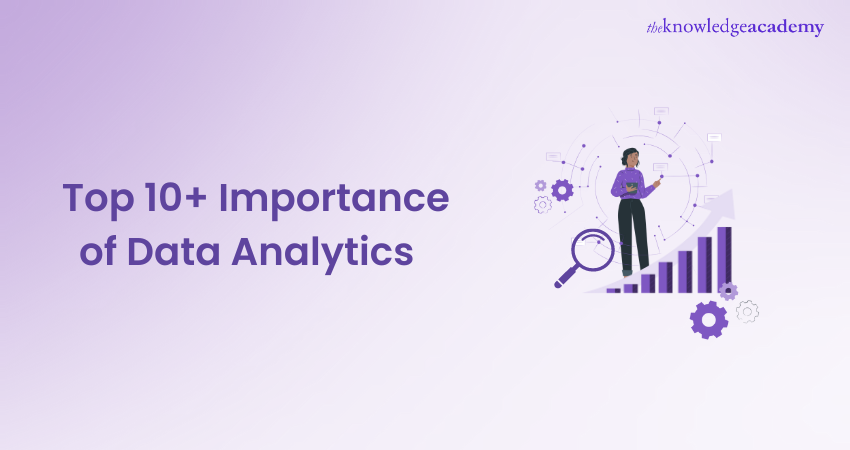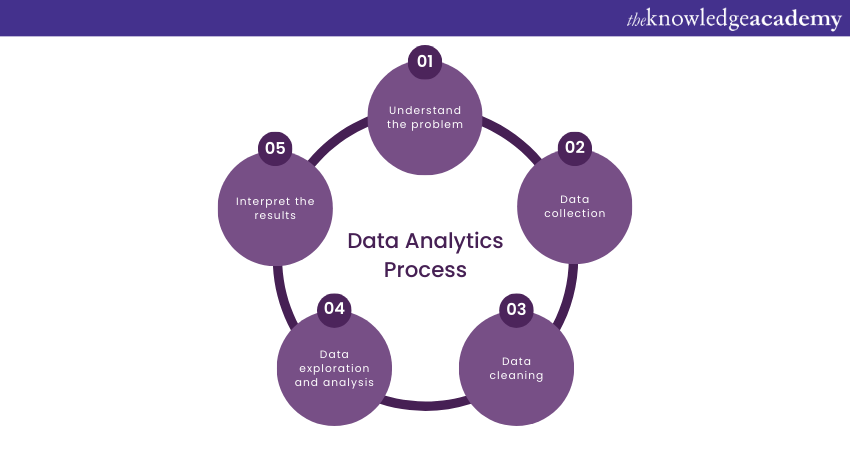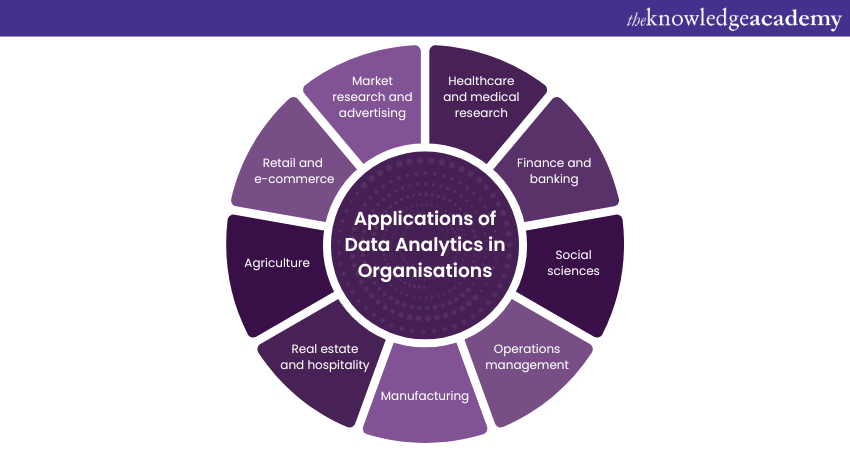We may not have the course you’re looking for. If you enquire or give us a call on +44 1344 203 999 and speak to our training experts, we may still be able to help with your training requirements.
Training Outcomes Within Your Budget!
We ensure quality, budget-alignment, and timely delivery by our expert instructors.

The saying "data is the new oil," popular in the early 21st century, is now outdated. A closer look shows that new applications being developed are collecting amounts of data that far exceed estimates from decades ago. This surge in data has heightened the importance of Data Analytics for both businesses and professionals.
According to a report from Statista, the Business Intelligence and Analytics Software market is will grow from 15.3 billion U.S. dollars in 2021 to more than 18 billion in 2026. These trends point towards a rapidly growing market with an increasing demand for analysts and Data Analytics professionals and the emergence of new verticals and data-driven organisations in the next couple of decades. Read this blog to learn more about the importance of Data Analytics and its applications in an organisation.
Table of Contents
1) What is Data Analytics?
2) Importance of Data Analytics
a) Data-driven decision-making
b) Competitive advantage
c) Personalisation and customer experience
d) Operational efficiency
e) Predictive analytics and forecasting
3) Applications of Data Analytics in organisations
4) Conclusion
What is Data Analytics?
Data Analytics is a process of collecting, transforming, and analysing large volumes of data. It helps in getting valuable insights, patterns, and trends that guide decision-making and foster improvements. It uses various tools, techniques, and algorithms to explore data and extract information. This process helps business firms to make well-informed decisions based on data, thereby securing a competitive advantage.

The data used in analytics can come from various sources, including structured data like databases and spreadsheets and unstructured data like text, images, and videos. There are different Types of Data Analytics, such as descriptive analytics, which summarises and describes the data. Diagnostic analytics, which identifies the cause of past events; predictive analytics, which forecasts future outcomes; and prescriptive analytics, which suggests actions to achieve desired outcomes.
Data Analytics is applied in several fields, including business and marketing, healthcare, finance, manufacturing, social sciences, and more. It lets companies to understand their operations better, identify growth opportunities, and address challenges effectively using the power of data. Furthermore, Data Analytics continues to evolve with technical advancements and the growing availability of big data. This provides even greater potential for companies to derive value from their data and increasing the importance of Data Analytics.
Importance of Data Analytics
Data analytics has been an important element in running businesses and decision-making processes since the advent of the century. Its importance will continue to grow as technology evolves. Here are some important points highlighting the importance of Data Analytics:
1) Data-driven decision-making
Data Analytics helps business firms to make informed and data-driven decisions. Instead of depending on intuition, gut feeling, or anecdotal experiences, data-driven decision-making uses data to gather insights, identify patterns, and draw conclusions, guiding the decision-making process.
This helps businesses get valuable insights into customer behaviour, market trends, and operational efficiency by analysing data in large volumes. It lets them make strategic choices for growth and success. Data-driven decision-making is mostly objective, unbiased and less influenced by personal preferences or biases.
2) Competitive advantage
Companies that use Data Analytics efficiently have several advantages in this digital era. Analysing data can provide unique insights into customer preferences and behaviour. This gives businesses a pivot to customise their products and services to meet various customer needs.
Businesses can also analyse different variables, from pricing strategies to marketing and branding campaigns and even customer feedback and reviews, using the data gathered. It helps them adapt and refine their strategies from time to time and win over their competitors.
3) Personalisation and customer experience
Data Analytics plays a big role in understanding individual customer preferences and behaviour. Companies can alter marketing campaigns and enhance the customer experience by analysing customer data. This increases customer loyalty.
Techniques like customer segmentation, predictive analysis, sentiment analysis, churn prediction, and integrating feedback loops can provide more personalised and frictionless services. This results in increased customer satisfaction, loyalty, and advocacy. Most businesses today align with a more customer-centric market approach. Therefore, Data Analytics provides the insights necessary to stay ahead of the competition.
4) Operational efficiency
Data Analytics helps companies achieve operational and process efficiencies. They can streamline workflows, reduce costs, and boost productivity by identifying inefficiencies and bottlenecks. Techniques like process optimisation, resource management, supply chain optimisation, predictive maintenance, and real-time monitoring provide businesses with deep insights into their operations.
This reveals precise details of their systems and opportunities for improvement. Embracing data-driven approaches lets firms optimise processes, resources, and performances. It also leads to cost savings and improved productivity and helps get a competitive edge in the marketplace.
5) Predictive analytics and forecasting
Businesses can use predictive modelling and forecasting to anticipate future trends and outcomes using Data Analytics advancements. This enables proactive planning and risk management, which help organisations to stay ahead of challenges and opportunities.
Predictive analysis involves the use of past data to build models and make predictions about future outcomes. The goal of predictive analytics is to identify patterns and relationships within the data to forecast what is likely to happen next.
6) Fraud detection and security
Data Analytics helps identify patterns of fraudulent activities and potential security threats. Businesses can identify patterns, anomalies, and suspicious activities that may indicate fraudulent behaviour or security threats by processing a huge volume of data.
Organisations may use this collected data to detect and prevent fraud, safeguard sensitive information, and protect against cyberattacks. The use of techniques and tools in Data Analytics may involve anomaly detection, network traffic analysis, behavioural analysis, fraudulent transaction analysis, geolocation tracking, data correlation, and identity verification.
7) Internet of Things (IoT) and Big Data
As IoT continues to expand, Data Analytics will be critical in processing and extracting invaluable insights from the vast amounts of data generated by IoT devices. IoT involves connecting everyday objects, machines, and devices to the internet to collect, exchange, and analyse data, creating a network of interconnected smart devices.
Data Analytics in IoT helps organisations make sense of this data and optimise operations, perform predictive maintenance, and implement real-time monitoring and alerts. It also helps improve healthcare and remote monitoring, optimise supply chains, and much more.
8) Healthcare and research
Data Analytics is transforming the healthcare industry by helping in medical research, disease diagnosis, treatment optimisation, and personalised medicine. It also helps in disease diagnosis and prediction, drug discovery, clinical trials, population health management, healthcare resource management, telemedicine, genomic Data Analysis, healthcare operations, quality improvement, and much more.
Data Analytics in Healthcare and research has transformed how medical data is analysed, interpreted, and utilised. When Data Analytics is integrated, it enhances the speed, accuracy, and efficiency of various processes. This led to better patient outcomes, scientific advancements, and more data-driven decision-making.
9) Supply chain optimisation
Data Analytics is a powerful tool in supply chain management that helps optimise different areas of the supply chain. Analysing the large volumes of data from different stages of the supply chain and making informed decisions helps in increased efficiency, cost reduction, and general performance in the business.
Businesses use demand forecasting, inventory management, supplier management, warehouse optimisation, risk management, and improved supply chain visibility to get important insights. It helps them make informed decisions and enhance the efficiency, responsiveness, and cost-effectiveness of the supply chain.
10) Data privacy and governance
Data Analytics will help ensure strict data governance and adherence to very strict laws toward data protection with increasing attention to data privacy and rising compliance regulations. Data privacy and governance include a set of policies, procedures, and controls that protect sensitive data, maintain conformity with regulations, and assure data integrity.
In addition, Data Analytics turns out to be a means for organisations to anticipate themselves in the management of risk data and in the guarantee of regulatory compliance, with this always being upheld in the confidence of their customers and stakeholders. With an increasingly data-driven world, this is one of the labours that protect sensitive information.
Unlock the power of data with our Advanced Data Analytics Certification Course - sign up now!
Applications of Data Analytics in organisations

Data Analysis can be applied across various industries to get valuable insights from raw data. This process is important in decision-making, problem-solving, and gaining a deeper understanding of various phenomena. Here are a few ways Data Analysis is commonly used across different sectors:
1) Retail and e-commerce:
Data Analytics helps with demand forecasting, inventory management, customer behaviour analysis, personalised marketing, and recommendation systems.
2) Market research and advertising
It helps market researchers understand consumer preferences, market trends, and competitor dynamics. They do this by analysing survey responses, customer feedback, and demographic data. Marketers can further refine their strategies by studying consumer behaviour, campaign performance, and customer segmentation. This lets them find targeted and personalised marketing efforts.
3) Healthcare and medical research
Data Analysis is critical in healthcare. It helps analyse patient outcomes, disease diagnosis, treatment optimisation, and clinical research. It also supports medical professionals in making evidence-based decisions for offering a better patient care.
4) Finance and banking
Financial analysts use Data Analysis to evaluate investment opportunities, track financial performance, and assess the risk associated with financial decisions. Data Analytics enhances decision-making processes and improves overall efficiency and risk management. In the financial industry, Data Analytics is used across various domains, including banking, insurance, investment, and financial services.
5) Manufacturing
In manufacturing, Data Analytics drives improvements in production processes, quality control, supply chain management, and overall operational efficiency. Applications of Data Analytics are predictive maintenance, defect detection, energy management, and inventory management.
6) Social sciences
Researchers use Data Analysis to study human behaviour, conduct surveys, and analyse demographic data. Data Analytics has transformed how social scientists understand human behaviour, societal trends, and various social phenomena. It helps them to analyse large datasets from diverse sources to derive insights and make evidence-based conclusions.
7) Operations management
Data analysis optimises supply chain management, inventory control, and production processes, enhancing operational efficiency and reducing costs.
8) Real estate and hospitality
Data Analytics assists in property valuation, market trend analysis, and investment decision-making. It also helps improve customer satisfaction, manage revenue, forecast demand, and create personalised guest experiences.
9) Agriculture
Data Analytics is revolutionising the agriculture industry by providing valuable insights and tools to optimise crop production, improve resource management, and increase overall efficiency. They use remote sensing and satellite imagery, precision farming, smart irrigation, livestock management, weather and climate analysis, and pest and disease management. It helps them optimise their operations, increase productivity, minimise resource wastage, and reduce environmental impact.
Embark on a data-driven career journey with our Data Science Analytics Course – join now!
Conclusion
Data Analytics is an important strategy organisations use to improve business growth. It helps in better decision-making processes, better experiences for customers, and ensuring the highest level of competition. Keeping in mind the rising volumes and complexity of data, it is considered that the importance of Data Analytics will be paramount in the upcoming years. We hope this blog has helped you learn importance of Data Analytics and various other factors about it.
Want to take your data skills to the next level? Explore our Big Data and Analytics Training Course today!
Frequently Asked Questions

Excelling in Data Analytics needs both technical and soft skills. This includes statistical analysis, programming skills in languages like Python and R, data manipulation and visualisation, machine learning, critical thinking, and strong communication. Mastering in these areas helps analysts to effectively extract and interpret complex data.

Business firms get a competitive edge with Data Analytics. It lets them make informed decisions, spot market trends, optimise operations, and tailor customer experiences. These skills provide crucial insights for product development, targeted marketing strategies, and enhancing customer satisfaction. All these are vital for organisations to achieve success.

The Knowledge Academy takes global learning to new heights, offering over 30,000 online courses across 490+ locations in 220 countries. This expansive reach ensures accessibility and convenience for learners worldwide.
Alongside our diverse Online Course Catalogue, encompassing 17 major categories, we go the extra mile by providing a plethora of free educational Online Resources like News updates, Blogs, videos, webinars, and interview questions. Tailoring learning experiences further, professionals can maximise value with customisable Course Bundles of TKA.

The Knowledge Academy’s Knowledge Pass, a prepaid voucher, adds another layer of flexibility, allowing course bookings over a 12-month period. Join us on a journey where education knows no bounds.

The Knowledge Academy offers various Big Data and Analytics Training, including Data Science Analytics Course, Big Data Analysis Course and Big Data Architecture Training. These courses cater to different skill levels, providing comprehensive insights into What is Data?
Our Data, Analytics & AI Blogs covers a range of topics offering valuable resources, best practices, and industry insights. Whether you are a beginner or looking to advance your skills, The Knowledge Academy's diverse courses and informative blogs have you covered.
Upcoming Data, Analytics & AI Resources Batches & Dates
Date
 Advanced Data Analytics Course
Advanced Data Analytics Course
Mon 12th Aug 2024
Mon 9th Dec 2024









 Top Rated Course
Top Rated Course



 If you wish to make any changes to your course, please
If you wish to make any changes to your course, please


